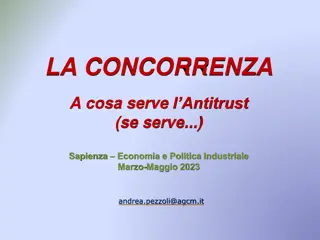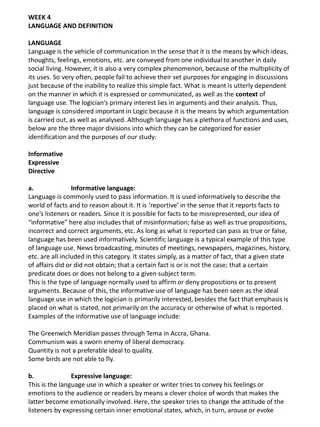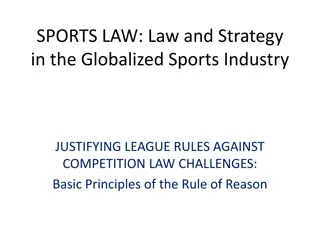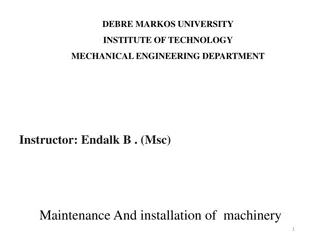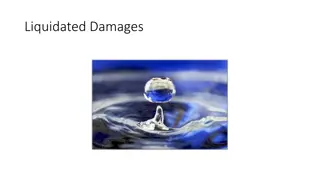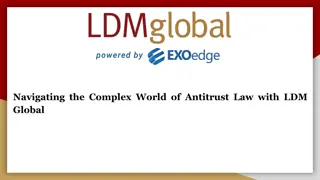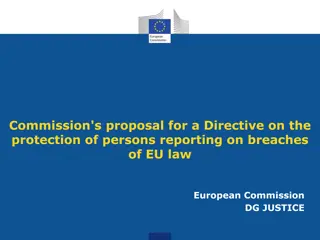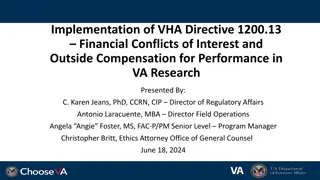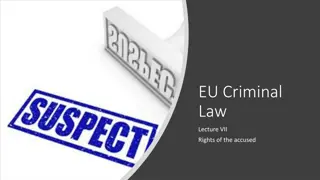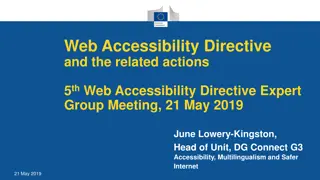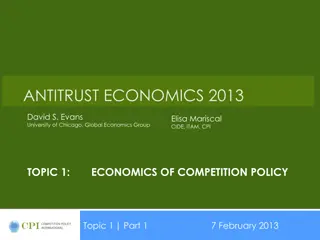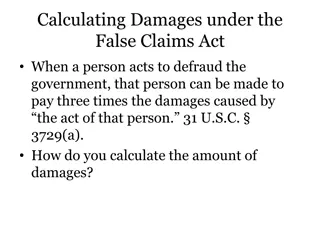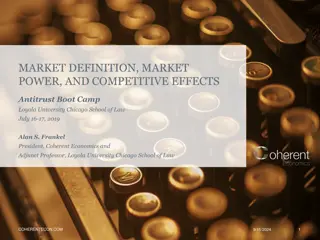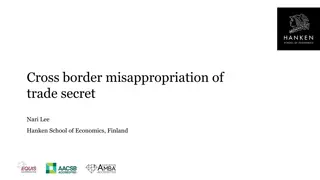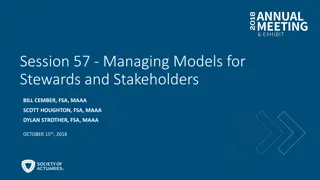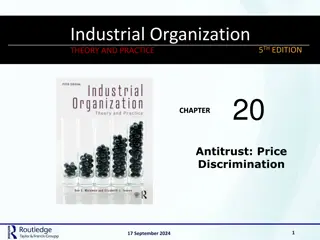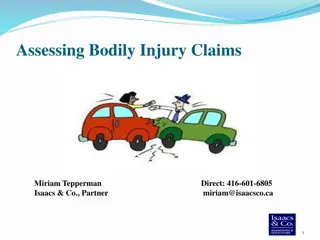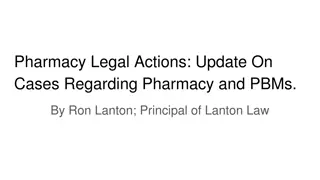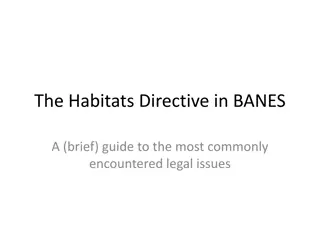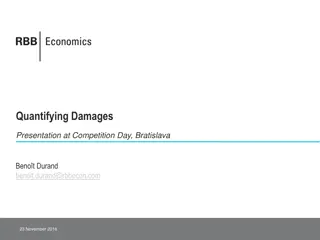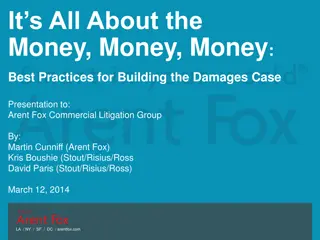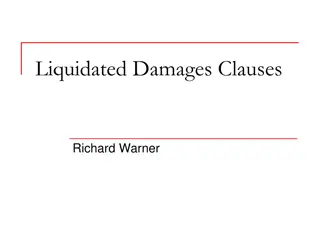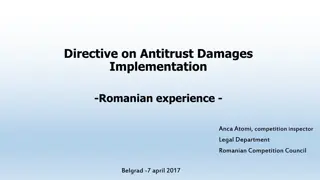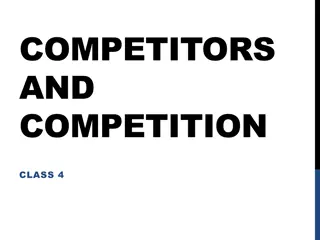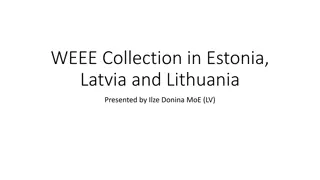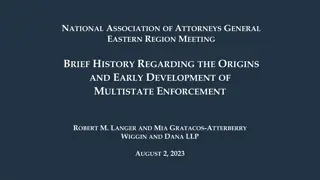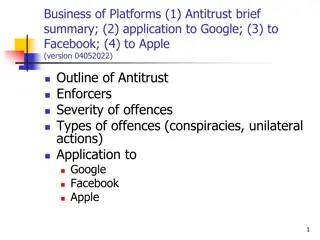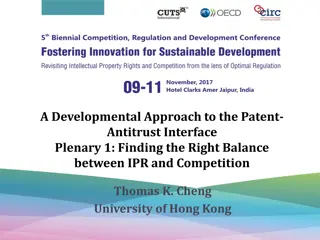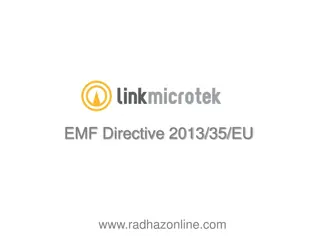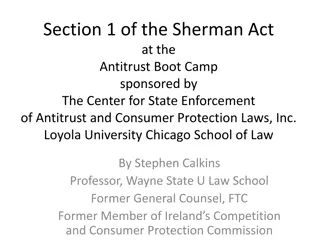Understanding Antitrust: Role, Objectives, and Challenges in Modern Economics
Antitrust laws aim to promote fair competition, protect consumer welfare, and uphold economic efficiency. The Antitrust authority plays a crucial role in preventing abuses, cartels, and monopolies, ultimately benefitting consumers through lower prices, innovation, and choice. The evolving landscape
6 views • 73 slides
Overview of EU Supply Chain Responsibilities and Sustainability Reporting by Rudolf Miller
Rudolf Miller, Director at T.V. NORD CERT GmbH in Switzerland, discusses the EU directive on corporate diligence in sustainability and the challenges faced by companies in ensuring compliance. The directive aims to improve corporate governance practices, reduce risks related to human rights and envi
6 views • 25 slides
Pragmatic Analysis of Directive Verbs in Progressive Relaxation
In this study, the Enaction Model and Impositive Strategy are applied to analyze the directive speech acts in Progressive Relaxation, a technique used in hypnosis. The research uses qualitative methods to examine the scripts and classifies the directive speech acts based on specific models. Previous
3 views • 9 slides
Navigating Antitrust Investigations with LDM Global
In today\u2019s complex business landscape, antitrust regulations have become a critical area of focus for companies operating in the United States. Navigating these regulations requires expertise and precision, particularly when facing investigations that could impact your business's reputation and
1 views • 13 slides
Understanding Language: Informative, Expressive, and Directive Uses
Language serves as a vital medium for communication, allowing the conveyance of ideas, thoughts, and emotions. It is a complex phenomenon with diverse uses. This text delves into the three major divisions of language use - informative, expressive, and directive. Informative language conveys facts, w
4 views • 6 slides
Understanding Horizontal Mergers and Antitrust Laws
Explore the concept of horizontal mergers and various types of mergers like vertical and conglomerate with real-world examples. Learn about the impact of mergers on market dynamics, profitability, and reasons why firms merge. Dive into the interplay between antitrust laws and merger trends, uncoveri
0 views • 19 slides
Strategic Insights into Antitrust in the Sports Industry
Exploring the intersection of sports and antitrust law, focusing on justifying league rules against competition law challenges, the importance of legal counsel in strategic outcomes, policy foundations of competition, and the basics of antitrust in sports leagues.
1 views • 18 slides
Common Damages in Machine Parts and Bearings
Sliding bearings and anti-friction bearings in machinery often experience wear, fatigue, and various damages due to factors like lubrication, alignment, and applied loads. The process of wear is influenced by wear velocity, operation conditions, and foreign substances, leading to overheating and cha
0 views • 34 slides
Understanding Liquidated Damages in Construction Contracts
Liquidated damages in construction contracts serve as predetermined compensation for delays in project completion, distinct from penalties for nonperformance. Contractors may have payments withheld if unsatisfactory progress causes time overruns. The SE-330 and OSE Manual outline procedures for asse
5 views • 21 slides
Navigating the Complex World of Antitrust Law with LDM Global
In today\u2019s dynamic business environment, maintaining fair competition is crucial for a healthy market economy. Antitrust laws, designed to prevent monopolies and promote competition, play a pivotal role in ensuring that businesses operate on a l
1 views • 13 slides
Proposal for Directive on Protection of Whistleblowers in EU Law
European Commission's proposal for a Directive aims to protect individuals reporting breaches of EU law, following wide-scale scandals like Dieselgate and LuxLeaks. The directive seeks to provide consistent whistleblower protection across Member States, enhance enforcement of EU law, and safeguard f
0 views • 16 slides
Implementation of VHA Directive 1200.13: Financial Conflicts of Interest and Outside Compensation in VA Research
The presentation discusses the implementation of VHA Directive 1200.13 concerning financial conflicts of interest and outside compensation for performance in VA research. It outlines key responsibilities for various roles, submission requirements for conflict of interest statements, training program
0 views • 21 slides
Understanding Tort Remedies: Types, Damages, and Mitigation Explained
Exploring the main remedies available in tort law, this content covers the concept of mitigation of loss, types of damages payable (such as general, special, nominal, contemptuous, aggravated, and exemplary damages), and scenarios illustrating these legal principles. Learn about injunctions, the imp
2 views • 24 slides
Overview of Amended Firearms Directive and Stricter Regulations
The Amended Firearms Directive aims to tighten rules on semi-automatic firearms, improve online acquisitions, enhance traceability of weapons, and facilitate information exchange among EU Member States. It also introduces stricter conditions for deactivated firearms and collectors to prevent crimina
0 views • 19 slides
Understanding EU Criminal Law and Directive 2013/48
Explore the rights of the accused under EU Criminal Law, focusing on minimum standards, the introduction of Directive 2013/48, its scope, and the right to access a lawyer. The Directive aims to strengthen defense rights and ensure a fair trial, highlighting the need for legal aid, interpreters, and
0 views • 30 slides
Web Accessibility Directive and Related Actions Overview
The Web Accessibility Directive outlines the timeline and objectives for making websites and mobile apps accessible in the European Union. Key measures and decisions taken to ensure compliance are discussed, including the establishment of a model accessibility statement and monitoring methodology. T
0 views • 9 slides
Improving Cancer Care Across European Countries with Cross-Border Healthcare Directive Evaluation
The content discusses the mission of ERN PaedCan to reduce cancer cases by providing advice, access to modern diagnostics and treatments, and expertise through Virtual Tumor Boards. It also highlights the European Governance structure, Key Performance Indicators, a Evaluation Study on the Cross-Bord
0 views • 7 slides
Economics of Competition Policy in Antitrust Practice
Understanding the importance of economics in antitrust practice is crucial as it involves applying economic concepts like markets, competition, and market power. Economists play a significant role in developing case theories and evidence, making economics indispensable in dealing with competition ag
1 views • 38 slides
Competition Damages Claims: Limitation Periods and CAT Rules Overview
The Consumer Rights Act 2015 introduced a new regime for competition damages claims, allowing for stand-alone and follow-on claims. However, limitations periods under the new regime, specifically Section 47E CA, apply only to claims arising after 1 October 2015. The CAT Rules play a crucial role in
0 views • 47 slides
Calculating Damages Under the False Claims Act
The False Claims Act allows the government to recover damages from individuals who defraud them. Damages are typically three times the amount of losses caused by the fraudulent act. Various methods can be used to calculate damages, such as determining the difference between what was paid and what wo
0 views • 17 slides
Understanding Antitrust Laws: Market Definition and Power Analysis
The economic purpose of antitrust laws is to ensure overall economic efficiency by focusing on whether a practice benefits or harms consumers. Antitrust cases involve defining relevant markets and assessing market power, distinguishing between market power and monopoly power. Understanding these con
0 views • 20 slides
EU Trade Secrets Directive: Misappropriation and Legal Framework Overview
The European Union Trade Secrets Directive sets out rules and harmonization for misappropriation of trade secrets across member states, allowing room for more extensive protection by individual countries. This directive addresses unlawful acquisition, use, and disclosure of trade secrets, along with
0 views • 28 slides
Antitrust Compliance Guidelines for Society of Actuaries Members
Guidelines for active participation in the Society of Actuaries, ensuring compliance with antitrust laws to avoid anti-competitive behavior during association activities. The guidelines emphasize avoiding discussions on sensitive topics like pricing, market allocations, and trade conditions to preve
0 views • 51 slides
Antitrust and Price Discrimination: Robinson-Patman Act Overview
The Robinson-Patman Act, a significant antitrust statute, aims to prevent price discrimination that harms competition, particularly targeting sellers granting discriminatory prices. While some price discrimination can enhance efficiency, predatory discrimination poses a serious threat to competition
0 views • 30 slides
Understanding Bodily Injury Claims: Types of Damages and Compensation
Explore the various types of damages in bodily injury claims, from general damages for pain and suffering to economic losses like past and future income. Learn about compensation for housekeeping, OHIP subrogated claims, medical care expenses, and out-of-pocket costs. Gain insights into assessing bo
0 views • 77 slides
Institutional Framework and Antitrust Law in the EU
The European Union's institutional framework is defined by the Treaties of Lisbon, European Union, and Functioning of European Union. These treaties establish the EU's objectives, governance principles, and delineate competences. Additionally, EU antitrust law principles are based on the Treaties of
0 views • 16 slides
Update on Pharmacy Legal Actions & Antitrust Cases
Explore the latest insights on pending class action lawsuits and antitrust claims impacting independent pharmacies, including discussions on current cases, the role of FTC, and the Rutledge v. PCMA lawsuit. Learn about class actions, certification processes, and important legal considerations in the
0 views • 20 slides
Guide to the Habitats Directive in BANES - Legal Issues Overview
The Habitats Directive, adopted in 1992, focuses on biodiversity conservation by protecting designated sites and species in the European territory. Key aspects include the Special Area of Conservation (SAC), European Protected Species (EPS), and developer responsibilities towards EPS protection. The
0 views • 8 slides
Quantifying Damages for Direct Purchasers: Methodology Presentation
This presentation by Benoît Durand covers the methodology for quantifying damages in cases involving direct purchasers, including factors like overcharge, passing-on, and lost business effects. It delves into the calculation of total damages and the estimation of overcharges during cartel periods.
0 views • 4 slides
Insightful Practices for Damages Case Presentations in Commercial Litigation
Importance of building a strong damages case, starting early, understanding basic timelines, utilizing the "But For" world concept, components of damage claims, legal theories for damages, and considerations for time periods in litigation.
0 views • 12 slides
Understanding Liquidated Damages Clauses in Contracts
Liquidated damages clauses serve to determine a precise amount of damages in case of contract breach when actual damages are difficult to ascertain. Courts enforce such clauses if they meet certain criteria based on reasonability and proportionality. Historical hostility towards these clauses has le
0 views • 17 slides
Implementation of Antitrust Damages Directive: Romanian Experience
In Romania, the transposition of the Antitrust Damages Directive involved key steps such as consultations, legal amendments, and drafting a new Act on Antitrust Damages Actions. The process also included decisions to adopt a new Act on Damages Claims for competition law breaches, addressing issues l
0 views • 9 slides
Understanding Competition in Market Structures & Antitrust Laws
Competition is the driving force in various market structures. Competitors make strategic choices that impact each other directly or indirectly. Antitrust laws prevent anti-competitive behavior like monopolies. The SSNIP test helps identify relevant markets for assessing competition. The case study
0 views • 12 slides
Overview of WEEE Collection in Baltic States
This presentation explores the WEEE (Waste Electrical and Electronic Equipment) collection practices in Estonia, Latvia, and Lithuania. It covers the targets set by the WEEE directive 2012/19/EU, the setup of collection systems, and the results achieved. The content delves into the minimum collectio
0 views • 19 slides
Overview of Antitrust Cases and Multistate Enforcement in U.S. Legal History
The content provides a historical overview of significant antitrust cases and multistate enforcement actions in the United States, including key court rulings and landmark legal proceedings involving state participation and enforcement of antitrust laws. It covers cases such as State of Georgia v. E
0 views • 18 slides
Antitrust Overview and Application to Big Tech Companies
Antitrust laws are enforced by agencies like the DoJ, FTC, and European Commission to prevent anti-competitive practices. Violations include conspiracies to fix prices or reduce output and unilateral actions by a single firm. Cartels and conspiracies are illegal, and companies can face severe penalt
0 views • 47 slides
Patent-Antitrust Interface: Balancing IPR and Competition in Developing Countries
Economic growth requires a balance between Intellectual Property Rights (IPR) and competition. Developing countries face challenges in incentivizing innovation while safeguarding consumer welfare. The discussion delves into the complexities of the patent-antitrust interface, emphasizing the need for
0 views • 6 slides
Understanding EMF Directive 2013/35/EU and UK Regulations
Employers are obligated to assess and mitigate risks related to electromagnetic fields (EMF) in the workplace, as outlined by the EMF Directive 2013/35/EU and UK regulations. The Directive provides guidelines for compliance, including risk assessments, protective measures, and a forthcoming Practica
0 views • 39 slides
Understanding Section 1 of the Sherman Act and Antitrust Laws
Section 1 of the Sherman Act prohibits contracts, combinations, or conspiracies that restrain trade or commerce among states or with foreign nations. Violations can result in felony charges, fines, and imprisonment. The section covers various antitrust practices such as price fixing, market division
0 views • 33 slides
Exploring Recontracting in Antitrust Regulations
Dive into the complexities of recontracting in antitrust and market power regulations, discussing issues like self-preferencing, leveraging, and pricing strategies by major players like Google, Amazon, and Apple. Explore the implications, legal standards, and regulatory tradeoffs surrounding this to
0 views • 14 slides
